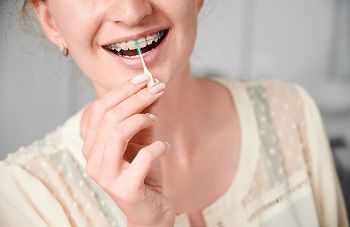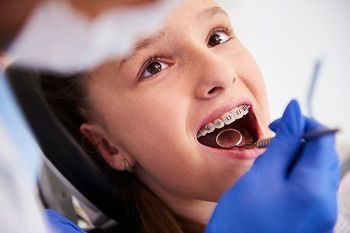How to care for your Orthodontic Appliances?
Dr. Hoss Abar
In this guide, we'll cover various aspects of caring for your orthodontic appliances, from maintaining oral hygiene to handling emergencies and everything in between. We'll delve into the do's and don'ts, offer insights into handling discomfort, provide guidance on a braces-friendly diet, and explain the significance of regular dental appointments throughout your treatment journey.
We understand that the world of orthodontics can sometimes feel overwhelming, with numerous considerations and adjustments to make. However, with knowledge, you can confidently navigate this exciting period. We aim to provide the information you need to control your orthodontic care and achieve the best possible results.
Oral Hygiene
Brushing and Flossing Techniques
Good brushing and flossing techniques are crucial for orthodontics care. They prevent cavities, remove plaque, and maintain healthy teeth and gums. Here are some tips for effective brushing and flossing.
- Choose the Right Toothbrush: Use a soft-bristled or electric toothbrush to clean your entire mouth effectively.
- Brush After Meals: Aim to brush your teeth at least twice daily, paying extra attention to the areas around your orthodontic appliances.
- Use the Right Technique: Brush gently at a 45-degree angle to your gum line. Cover all surfaces in small circles. Be gentle to avoid damage.
- Spend Enough Time: Brush for 2 minutes with a timer or electric toothbrush.
- Remember the Gumline: Brush gently along the gumline to remove plaque and food particles.
- Clean Your Tongue: Brush or use a tongue scraper to clean your tongue gently. This helps remove bacteria responsible for bad breath.
- Flossing with Braces: Use a specialized flossing tool for braces to thread floss under the wire. Move up and down between teeth to clean both sides.
- Interdental Brushes: Use small brushes with bristles to clean between teeth, brackets, or wires. Move the brush back and forth to remove trapped food particles or plaque.
- Water Flossers: Water flossers use water to clean between teeth and around appliances. They're helpful but don't replace traditional flossing.

Mouthwash and Rinse
Mouthwash and rinses can freshen breath, reduce plaque, and promote gum health. Use them in addition to brushing and flossing for better oral hygiene.
- Choose the Right Product: Look for mouthwashes or rinses for orthodontic patients. They may contain ingredients that help control plaque or soothe oral tissues.
- Follow Instructions: Read and follow the instructions on the product label carefully. Some rinses may need to be diluted or used at specific times of the day.
- Timing Matters: Rinse your mouth after brushing and flossing, then wait 30 minutes before eating or drinking to let the active ingredients work.
Diet and Nutrition
Food Restrictions
Be mindful of what you eat during orthodontic treatment to avoid damaging your appliances. Stick to nutritious food options and avoid hard or sticky foods.
- Sticky and Chewy Foods: Avoid sticky and chewy foods like gum and candy to prevent damage and make cleaning easier for braces and aligners.
- Hard and Crunchy Foods: Avoid hard candies, nuts, ice, popcorn, and tough meats to prevent damage to your braces.
- Foods Requiring Biting Into: Cut hard foods into small pieces instead of biting into them to avoid potential harm.
- Sugary and Acidic Foods: Limit sugary and acidic drinks and snacks to prevent tooth decay and erosion.
Maintaining a balanced diet is crucial for oral health, supporting orthodontic treatment, and being aware of food restrictions.
Healthy Eating Habits
Eating healthy while undergoing orthodontic treatment is essential for your well-being and success. Here are some tips:
- Opt for Nutrient-Rich Foods: Eat a balanced diet with lots of fruits, veggies, lean proteins, whole grains, and dairy for healthy teeth and gums.
- Soft and Easy-to-Chew Foods: Try incorporating soft foods like yogurt, smoothies, and soups into your meals for easier chewing and to be gentle on your appliances.
- Hydrate with Water: Drink water to keep your mouth healthy and wash away food particles and bacteria.
- Mindful Snacking: Choose orthodontic-friendly snacks like soft fruit slices, yogurt, cheese, hummus, or nut butter. Brush your teeth to prevent plaque buildup.
Healthy eating protects your orthodontic appliances and supports oral health. A well-nourished smile is a happy smile!
Regular Dental Appointments
Importance of Check-ups
Regular dental appointments are essential for monitoring progress, adjusting, and ensuring orthodontic treatment stays on track.
- Progress Assessment: Your orthodontist checks your teeth movement, appliance effectiveness, and progress towards treatment goals, making adjustments or recommendations for optimal results.

- Early Detection of Issues: Regular check-ups help catch dental issues early on, like tooth decay and gum disease, preventing long-term treatment setbacks.
- Maintenance of Oral Health: Dental appointments keep your teeth clean and healthy during orthodontic treatment.
- Guidance and Support: Your orthodontist and dental team will help you with any questions or concerns during your orthodontic treatment. They can advise on oral hygiene, discomfort, and optimizing your experience.
Schedule Maintenance Appointments
Regular maintenance appointments are important for keeping your orthodontic appliances in good condition and on track with your treatment.
- Orthodontic Adjustments: Your orthodontist may need to adjust your braces or aligners periodically to ensure your teeth move in the right direction.
- Retainer Checks and Fittings: As you near the end of orthodontic treatment, maintenance appointments will involve checking your retainers. Adjustments or replacements may be recommended to maintain long-term stability and prevent tooth shifting.
- Compliance Monitoring: Maintenance appointments allow your orthodontist to monitor your treatment progress, provide guidance, and adjust as needed.
Maintenance appointments vary based on your treatment needs. Your orthodontist will give you specific visit guidelines.
Dealing with Discomfort
- Over-the-Counter Pain Relief: For soreness, take pain relievers as directed by your healthcare professional. It can alleviate discomfort and reduce inflammation.
- Rinse with Saltwater: Gargle warm salt water a few times daily. It's soothing and promotes healing.
- Applying a Cold Compress: A cold compress reduces swelling and discomfort. Use an ice pack wrapped in a thin cloth and place it on the affected area for 10-15 minutes.
- Eating Soft Foods: Eat soft foods like mashed potatoes, soups, yogurt, smoothies, and pasta. Avoid hard and chewy foods that can worsen soreness.
- Orthodontic Wax: Orthodontic wax reduces irritation from braces or appliances. Apply it to rough or uncomfortable areas to create a barrier and reduce friction.
Emergency Care
Loose or Broken Appliances
Sometimes, despite your best efforts, orthodontic appliances may become loose or broken. It's important to know how to handle such situations. Here's what you should do:
- Stay Calm: In case of a loose or broken appliance, stay calm and assess the situation. Take a deep breath and remember that there are solutions available.
- Contact Your Orthodontist: Contact your orthodontist immediately for advice and potential urgent appointment scheduling based on your case.
- Temporary Fixes: Protect your gums with orthodontic wax and seek professional help instead of cutting the wire yourself.
- Preserve any Loose Pieces: If a part of your braces falls off, save it and bring it to your emergency appointment. Your orthodontist may be able to reattach it.
Injury or Trauma
Act quickly if you injure your mouth or braces: take immediate action.
- Assess the Situation: Assess your injury and check for damage to appliances. Call emergency services immediately if there is severe bleeding or a medical emergency.
- Call Your Orthodontist: Contact your orthodontist immediately about the injury. They'll advise you based on the severity of the situation and may suggest a visit to their office or a hospital as needed.
- Manage Discomfort and Bleeding: Apply pressure to stop bleeding and take pain relievers as directed until help arrives.
- Emergency Dental Care: If there's significant damage to your teeth, gums, or appliances, see an emergency dentist ASAP. They'll address urgent issues and ensure your oral health is safe.
Contact your orthodontist immediately for emergencies and follow their instructions carefully to prevent further discomfort and complications.
In the face of an orthodontic emergency, remain calm, take the necessary steps to manage the situation, and seek professional help as soon as possible. By being prepared and knowing how to respond, you can effectively navigate unexpected situations and minimize disruptions to your orthodontic treatment.
Remember, maintaining excellent oral health is a lifelong commitment. Your orthodontic treatment has provided a foundation for a healthy smile, but it's up to you to continue caring for your teeth and gums. Embrace good oral hygiene habits, maintain regular dental check-ups, and make healthy choices to maximize the benefits of your orthodontic journey.
If you have any additional questions or concerns, please feel free to reach out to your orthodontist or dental professional. They are there to guide and support you on your path to a lifetime of healthy smiles.
Contact your Pinole Orthodontics, Dr. Hoss Abar, DDS, MSD at Abar Orthodontics, to learn how to care for your Orthodontic Appliances.
Resource:
How to maintain dental hygiene with braces?
*This media/content or any other on this website does not prescribe, recommend, or prevent any treatment or procedure. Therefore, we highly recommend that you get the advice of a qualified dentist or other medical practitioners regarding your specific dental condition.*
More To Explore
About Us
We believe that every patient deserves to feel confident about their smile. Years of experience creating beautiful and flawless smiles.
© 2024Abar Orthodontics | All rights reserved | Powered by:Vigorant, Inc.
